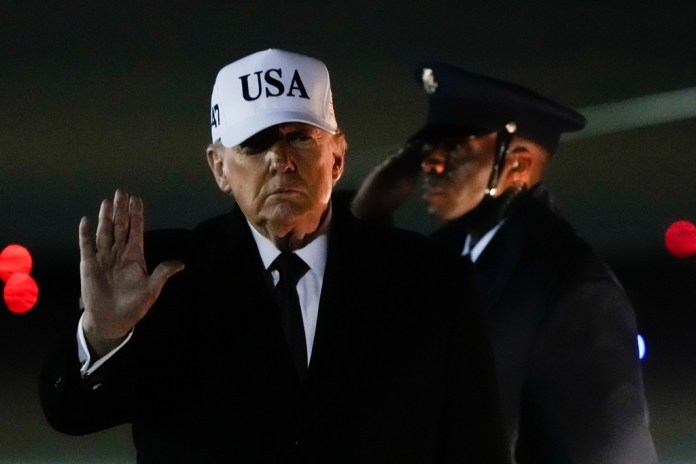AI regulation ban eludes White House despite defense bill push
The article discusses an effort to ban states from passing new laws regulating artificial intelligence (AI),a proposal supported by former President Donald Trump and some House GOP leaders who sought to include it in the upcoming National Defense Authorization Act (NDAA). Though,the measure faces significant opposition from senior lawmakers,including Democrats and Republicans,who criticize it for undermining states’ rights,lacking committee consensus,and potentially benefiting big Tech improperly. Previous attempts to impose a similar moratorium failed in the Senate with an overwhelming vote against it.
Lawmakers are concerned that a blanket ban on state AI regulations without a national framework could allow harmful AI uses such as deepfakes and scams to grow unchecked. The NDAA, a must-pass defense bill, frequently enough includes unrelated priority provisions, but the AI regulation ban remains particularly contentious amid ongoing negotiations. Simultaneously occurring, the White House has considered executive actions to prevent state AI laws but has paused such plans. The administration favors a more permissive federal approach to AI progress, aiming to remove barriers and support innovation.
As states like California and Colorado begin implementing their own AI rules, the controversy highlights the tension between federal control and state-level regulatory innovation in the rapidly evolving AI landscape. the NDAA vote is expected by mid-December as congress works to finalize various legislative issues.
AI regulation ban eludes White House despite defense bill push
A push to ban states from passing new laws on artificial intelligence is likely to fall short on Capitol Hill despite a late plea from President Donald Trump.
Trump publicly threw his weight behind the ban on Tuesday, asking that it be added as part of a defense bill that will soon be sent to his desk. Behind the scenes, House GOP leadership also spent the week pressing for its inclusion.
Yet, one by one, senior lawmakers have rebuffed the language as a nonstarter, creating serious doubts that it will be part of the National Defense Authorization Act when it gets brought for a vote in December.
Sen. Jack Reed (D-RI), the top Democrat on the Senate Armed Services Committee, panned the legislation as a giveaway to Big Tech that inappropriately diminishes states’ rights.
Rep. Mike Rogers (R-AL), the chairman of the House’s Armed Services panel, had more procedural concerns with its inclusion, telling Politico that committee-level disagreements were enough for him to withhold his support.
“I’m going to be opposed to that,” Rogers said. “Historically, we add things to the NDAA when the four corners of the committees of jurisdiction agree to it, and I understand that’s not the case here, which means I’m gonna have a problem with it.”
As one of the few must-pass pieces of legislation, it’s common for unrelated priorities to hitch a ride on the NDAA, meaning everything from sanctions relief to federal housing policy is being negotiated at the eleventh hour.
The AI language is particularly controversial, however, and has already been rejected once by lawmakers. Sen. Ted Cruz (R-TX), the chairman of the Commerce Committee, attempted to add the moratorium to Trump’s tax law earlier this year, but it was stripped out in a 99-1 Senate vote.
Advocates believe state laws could slow what has become an AI investment boom. Trump also mentioned competition with China in framing the legislation as a national security imperative.
Yet lawmakers are simultaneously wary of imposing a state ban without a national framework first, believing that a blanket moratorium would allow deepfakes and AI-assisted scams to proliferate unchecked.
The latest push comes as Congress attempts to wrap up its legislative business for the year, with a vote on the NDAA expected before mid-December. Staff on the Armed Services committees are at this point dealing with the bill’s finer details, according to a source familiar with the matter. There are, however, outstanding issues beyond the AI language.
Housing legislation could be included in the NDAA, but it is still being negotiated between the House and Senate. Another possible stumbling block, the repeal of sanctions on Syria, was resolved earlier this week after Rep. Brian Mast (R-FL), the chairman of the House Foreign Relations Committee, dropped his objections.
In his plea to Congress, Trump expressed openness to including the ban on AI regulations in another piece of legislation. The White House has also been considering unilateral action that, if taken, could have a chilling effect on new state laws.
A leaked draft executive order suggested the White House might threaten to withhold state funding or sue through an AI Litigation Task Force. As of Friday, that executive order has been shelved, according to Reuters, and the White House has previously dismissed reporting on the possible order as “speculation.”
REPUBLICANS RISK OBAMACARE PARALYSIS WITH RENEWED HEALTHCARE DEBATE
Separately, the administration has taken steps to remove federal barriers to AI development, releasing a “plan of action” in July that includes rolling back permitting requirements for data center construction.
The administration’s light-touch approach comes as states such as California and Colorado begin to place new guardrails around AI and its development. Well over half of all states have enacted measures regulating the technology this year, according to the National Conference of State Legislatures.
" Conservative News Daily does not always share or support the views and opinions expressed here; they are just those of the writer."



